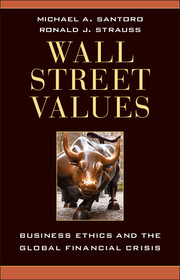Book contents
- Frontmatter
- Contents
- Preface
- Acknowledgments
- Part One Background and Theoretical Framework
- Part Two Wall Street Business Model, Regulation, and Values in Transition
- Part Three Policy Recommendations and Sustainable Values for Wall Street in the Twenty-First Century
- Chapter Six Wall Street Regulation for the Twenty-First Century
- Chapter Seven Wall Street Values for the Twenty-First Century
- Notes
- Index
Chapter Six - Wall Street Regulation for the Twenty-First Century
from Part Three - Policy Recommendations and Sustainable Values for Wall Street in the Twenty-First Century
Published online by Cambridge University Press: 05 February 2013
- Frontmatter
- Contents
- Preface
- Acknowledgments
- Part One Background and Theoretical Framework
- Part Two Wall Street Business Model, Regulation, and Values in Transition
- Part Three Policy Recommendations and Sustainable Values for Wall Street in the Twenty-First Century
- Chapter Six Wall Street Regulation for the Twenty-First Century
- Chapter Seven Wall Street Values for the Twenty-First Century
- Notes
- Index
Summary
Human greed isn’t going to go away but you can put some limitations on it.
Paul VolckerIntroduction
Wall Street, enabled by accommodating government policies, has drifted far away from the business model that for a half-century efficiently allocated capital among American business ventures. Its profitability is no longer congruent with overall social welfare. This divergence between private profits and public welfare has become so great that Wall Street has fallen below even the minimal standard of corporate social responsibility advocated by free market icon Milton Friedman. The public can no longer rely on Wall Street to facilitate the flow of market information and help distribute capital to its most productive uses. Wall Street even deceived and lied to its own clients to generate profits and mitigate the losses it would suffer from trading misadventures in mortgage-backed securities. When the final reckoning came, it was taxpayers who had to pay the bill for Wall Street’s self-inflicted wounds in the form of a massive government bailout.
This chapter describes the steps government has taken to restore integrity to financial markets, reduce systemic risk, and bring Wall Street back into alignment with Main Street. In particular, we focus on the Volcker Rule prohibitions on proprietary trading, as well as the regulation of derivatives and increased capital requirements limiting leverage.
- Type
- Chapter
- Information
- Wall Street ValuesBusiness Ethics and the Global Financial Crisis, pp. 155 - 177Publisher: Cambridge University PressPrint publication year: 2012
- 1
- Cited by



